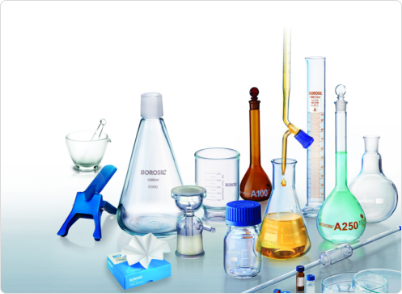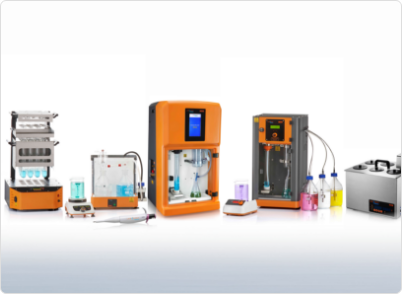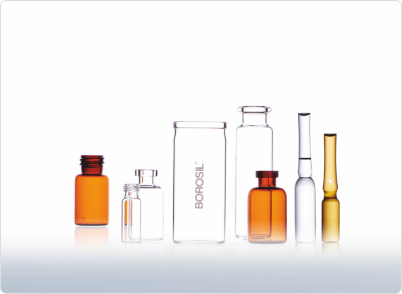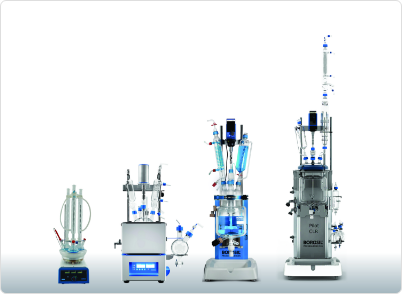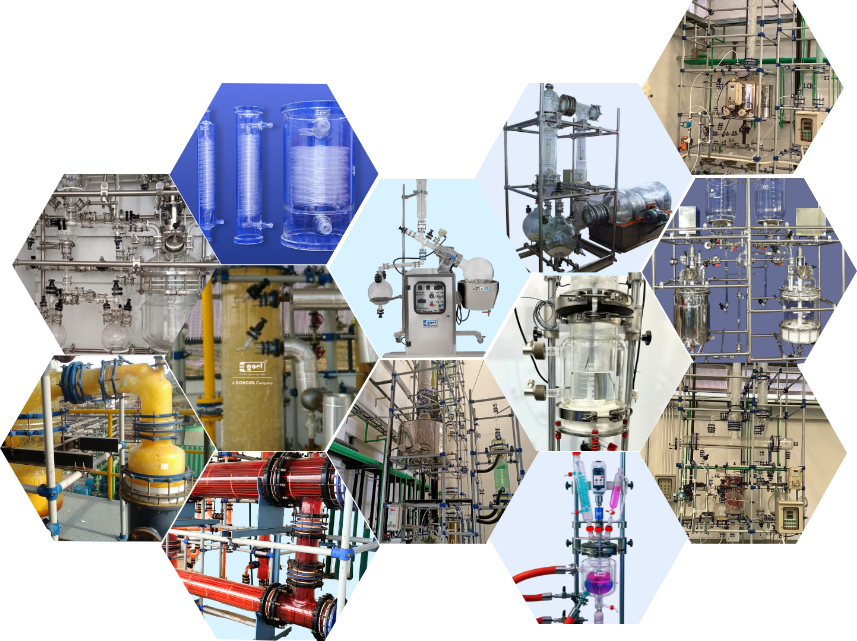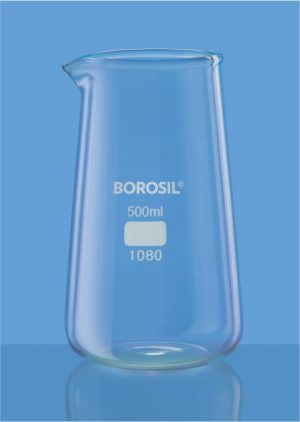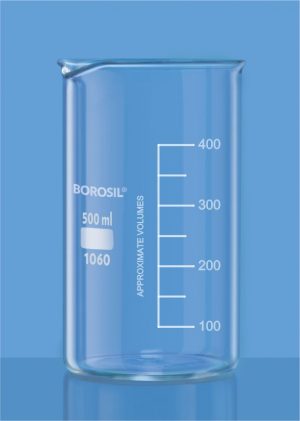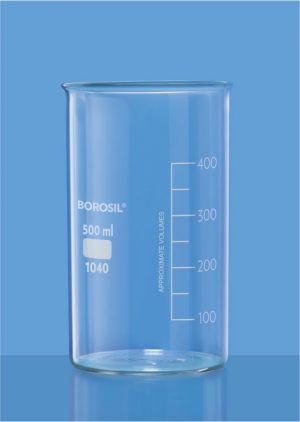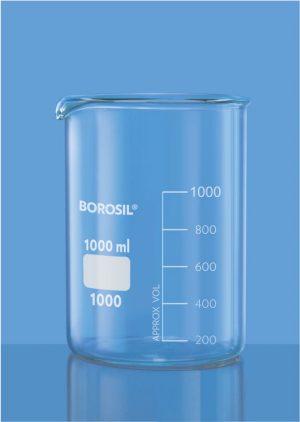Laboratory Beakers
Beaker glassware is foundational in laboratory workflows across pharmaceutical R&D, industrial quality control, and academic research environments. Lab glassware beakers offer reliable chemical resistance and thermal stability. Borosil Scientific’s range of beaker laboratory equipment is made from 3.3 low-expansion borosilicate glass, conforming to global standards such as IS 2619, ISO 3819, and DIN 12331.

What is a Laboratory Beaker?
A laboratory glass beaker is a cylindrical vessel used for stirring, heating, and holding chemical solutions. Its straight sides and open top make it ideal for titrations, reagent prep, and general mixing. Most glass beakers’ designs include a spout for pouring, and some, like the Phillip (Conical) form, have a narrowed mouth to reduce spillage and exposure.
|
Parameter |
Description |
|
Material |
3.3 Borosilicate Glass |
|
Form |
Tall, Low, Conical |
|
Spout Availability |
With or Without |
|
Capacity Range |
50 mL – 5,000 mL |
|
Compliance |
IS 2619 / ISO 3819 / DIN 12331 |
Borosil Scientific’s precision beakers, such as the 1080 Conical Beaker and the 1060 Tall Form Beaker with spout, balance mechanical strength with thermal uniformity. All glass beakers go through uniform wall distribution and annealing for long-term stability.
Types of Laboratory Beakers
Different lab applications require different beaker geometries. Choosing the correct one affects everything from thermal transfer efficiency to pouring precision.
-
Tall Form Beaker: Designed for heating via liquid baths, especially where immersion depth matters. Ideal for titrations or long-duration heating.
-
Low Form Beaker: The wide-mouth format is ideal for general mixing and reagent dilution. A stable base reduces tipping risk.
-
Conical Beaker (Phillip Pattern): Features a mouth narrower than its base. Suited for decanting, swirling, and reducing evaporative loss. Common in pharma formulation setups.
-
Beaker with Spout: Available across most forms. Supports controlled pouring without drips or splashes.
|
Form |
Ideal Use Case |
Borosil Code |
|
Tall Form |
Heating, titration |
1060, 1040 |
|
Low Form |
Reagent mixing, dilution |
1000 |
|
Conical |
Swirling, reduced evaporation |
1080 |
Materials Used in Laboratory Beakers
Not all beakers are created equal. Material composition determines not only heat resistance but also compatibility with corrosive reagents.
-
Borosilicate Glass (3.3 Expansion Coefficient): Used in all Borosil Scientific beakers, this glass offers excellent resistance to thermal shock, autoclaving, and aggressive chemicals. It ensures clarity, durability, and dimensional stability under repeated lab use.
-
Plastic Beakers: Used occasionally for lightweight, non-heated tasks. However, they lack the thermal and chemical resilience of borosilicate glass.
For accurate, high-performance lab work, Borosil Scientific recommends using its calibrated beaker glassware made from certified borosilicate glass.
Common Laboratory Beaker Applications
Whether it’s simple solution prep or aggressive thermal cycling, beakers for laboratory use cases are broad and diverse.
|
Application |
Recommended Beaker Type |
|
Reagent Mixing |
Low Form (1000) |
|
Liquid Heating |
Tall Form (1060, 1040) |
|
Decanting Volatile Liquids |
Conical / Phillip (1080) |
|
Titration Setup |
Tall Form with spout (1060) |
|
Evaporation Reduction |
Conical (Phillip) with spout |
All Borosil Scientific beakers are chemically annealed, machine-blown, and designed with reinforced rims to withstand daily use in high-throughput labs.
Choosing the Right Laboratory Beaker
Picking the right lab beakers isn’t about preference but performance.
-
For heating-intensive workflows: Use the tall form, uniform wall thickness beakers like 1060 with narrow tolerance bands.
-
For reagent prep or dilution: Opt for the 1000 low-form series. Their wide mouth and large labelling field simplify the workflow.
-
For field stability and precise pouring: The 1080 Phillip Pattern conical beaker with spout delivers directional control and reduced splashing.
Checklist for Key Selection Criteria
-
Graduation Clarity: Borosil Scientific uses fired-on, easy-to-read scales.
-
Thermal Uniformity: Controlled wall distribution across all forms.
-
Spout Precision: Clean edges, drip-free delivery.
-
Chemical Resistance: Withstands strong acids, alkalis, and organic solvents.
A round beaker has a wider mouth and flat bottom for mixing, while flasks (like Erlenmeyer) have conical shapes for swirling and storage. Beakers suit prep, flasks suit containment.
Only borosilicate lab glassware beakers like those from our collection can safely endure microwave cycles. Plastic variants may melt or warp.
Some can, but repeated cycles degrade performance. So, we always recommend glass beakers for consistent autoclave durability.
Beakers aren’t volumetric instruments, and so, graduation markings are approximate. Calibrated marks are for reference only, with ±5% variance unless otherwise specified.
Beakers are commonly used for mixing, heating, decanting, and diluting solutions, offering both accuracy and thermal resistance, essential for daily lab operations. Borosil Scientific’s beakers are designed to meet these demanding applications with reliability.









